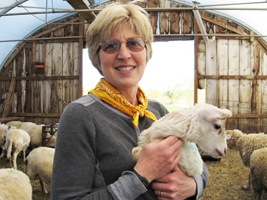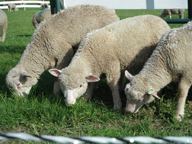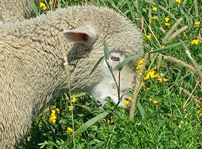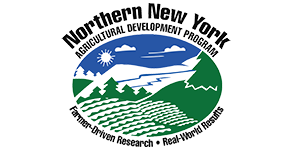
 Photo, left: Cornell Cooperative Extension (CCE) livestock specialist Betsy Hodge leads the 2021 NNYADP project evaluating indoor-outdoor summer feeding options to enhance lamb health. Photo, right: The CCE St. Lawrence County Extension Learning Farm in Canton, New York, is hosting Northern New York Agricultural Development Program-funded research evaluating indoor-outdoor summer feeding options for lambs. Photo courtesy of Betsy Hodge.
Photo, left: Cornell Cooperative Extension (CCE) livestock specialist Betsy Hodge leads the 2021 NNYADP project evaluating indoor-outdoor summer feeding options to enhance lamb health. Photo, right: The CCE St. Lawrence County Extension Learning Farm in Canton, New York, is hosting Northern New York Agricultural Development Program-funded research evaluating indoor-outdoor summer feeding options for lambs. Photo courtesy of Betsy Hodge.
NOTE: Cornell University Animal Science Extension Associate tatiana Stanton, Ph.D. spells first name with lower case t
Canton, N.Y.; May 26, 2021. Can the health of young lambs be enhanced by raising them in a barn or on summer pasture? The Northern New York Agricultural Development Program is funding research investigating if the protective environment of a barn, away from the risk of infection and death caused by the parasites that buildup on summer pastureland, will enhance lamb health.
The project, funded by the farmer-driven research program, will evaluate whether weaning lambs at 8 to 10 weeks old, bringing them into the barn, and feeding them a completely balanced diet will help the young sheep grow faster than lambs that are raised on pasture.
“As summer progresses, hot, dry weather can cause a decline in the quantity and quality of pasture available for lambs and sheep. Sheep on pasture can experience a buildup of parasites as well as increased risk from predators. Additionally, mother ewe milk production tends to drop off after 10 weeks after lambing. Sheep owners need more strategies for protecting their animals,” Betsy Hodge, a livestock specialist with Cornell Cooperative Extension of St. Lawrence County, explains.
Hodge manages the sheep flock at the Cornell Cooperative Extension of St. Lawrence County Extension Learning Farm in Canton, New York. This NNYADP 2021 project will wean one group of lambs at 60 days of age and feed them a complete dietary ration in a barn. A second group of lambs will remain on pasture with mother ewes for 95 to 105 days.

A preliminary study in the summer of 2020 favored leaving the lambs on pasture. This second year of data will help identify and evaluate year-to-year variables before any recommendations are developed.
“We are interested to see if this new research will provide different insights into whether the lambs in the barn will take off on the grain and grow faster than their pastured counterparts. Will they require less de-wormer treatment because they are inside? How will the heat of summer impact each group? Will the ewes be in better body condition and therefore easier to breed back?” says Hodge.
The project data sets will include lamb growth, weight gain, health scoring, and parasite loads for each group of lambs. Analysis of the complete feed ration, forages, and pasture diet will evaluate the role of different nutritional sources. Body condition scoring will also be recorded for both groups of ewes. A cost comparison is also part of the project objectives.
Cornell University Animal Science Department Chair Thomas R. Overton, Ph.D. and Animal Science Extension Associate tatiana Stanton, Ph.D. will provide project oversight and analysis. A Cornell University undergraduate student will assist with the project through the Cornell Cooperative Extension Summer Internship program.

Funding for the Northern New York Agricultural Development Program is supported by the New York State Legislature and administered by the New York State Department of Agriculture and Markets. Learn more at https://nnyagdev.org.